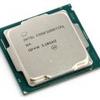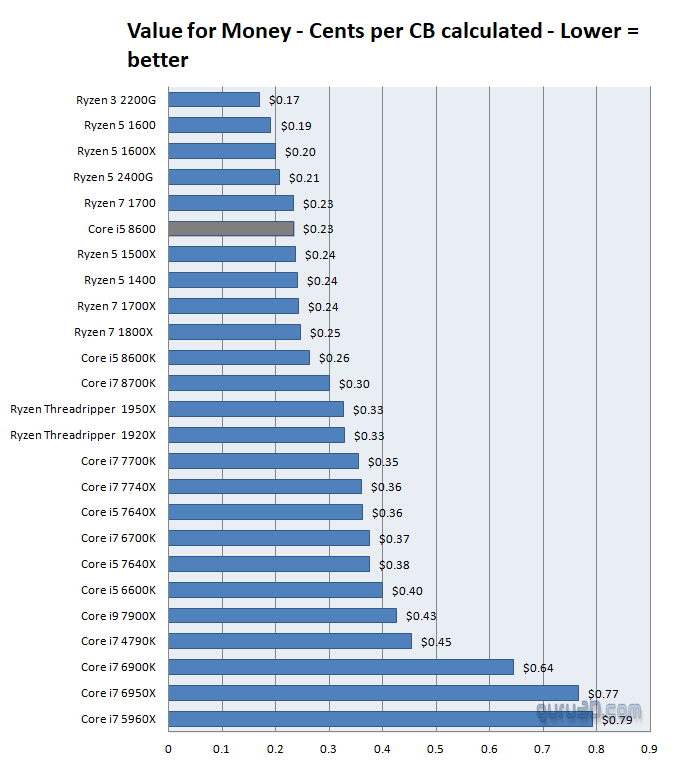Final Words & Conclusion
Conclusion
If you are not into tweaking/overclocking and need a proper gaming processor (with a dedicated graphics card), well hey, you might have found your sweet-spot processor. In idle and average usage the Core i5 8600 is a very energy friendly CPU, and with the same Turbo's available as it's 8600K counter-part, you will be just as fast. You get six cores, six threads. With heavily multi-threaded brute force on the CPU applications, for the multi-threading mongers, you will have to forfeit a little, lacking Hyper-threading and the smaller L3 cache, that is measurable and noticeable on the overall performance. But you do get six proper gaming cores that clock themselves to 4100 MHz and if single threaded, 4.3 GHz. If you look at IPC at 3500 MHz then Coffee Lake certainly isn't any faster compared to the previous gen product. However, Intel benefits greatly from the fact that they can reach high clock frequencies. Turbo mode 3.0 remains a bit of a gimmick, little software is totally single threaded these days, but it places 4.3 GHz on the box packaging with big chocolate letters which is great for their marketing. Realistically though, Intel reaches 4.1 GHz on all six cores, that fact by itself is very nice, the platform also manages heat and power consumption at very acceptable levels.
Performance & tweaking
I'd rate the new 6-core processor as 'good' for the results as tested looking at it as an overall processor, and 'very good' for gaming versus money invested. Temps are fine under default circumstances and clocks frequencies. Tweaking, however, is not really an option with a non-K model, unless you want to overclock on the bus frequency, which can be troublesome and complicated
Power consumption
With this six-core proc and a new base clock of 3.1 GHz, Intel is listing this CPU at a 65 Watt TDP. With the system at idle with a GeForce GTX 1080 installed / 16 GB memory / SSD and the H370 motherboard, I hovered at roughly 35 Watts in IDLE. That's just lovely, the load values are okay. When we stressed the processor 100% run we reach roughly ~105 Watts with this 6-core / 6-threaded part. When we game we hover at ~265 Watts with the GeForce GTX 1080, but obviously that factor is dependent on the type of graphics card you use of course and sure, most games certainly do not utilize the six CPU cores. Overall I have no worries here.
Prices and value
In the above a mathematical plot, we take the CB score from CineBench 15. We normalize the value and basically plot how much money it takes to calculate the CB score. All processors are clocked at default frequencies, this plot would look different if you'd math in tweaked clock frequencies and thus get higher CB scores. Also, you need to take the number of CPU cores into account (as in what number of CPU cores is relevant for you). But this is very simple math, have a peek at the chart (the higher a CPU is positioned the better).
So what are you seeing?:
- An 8-core Core i7 5960X costs 79 cents per calculated CB.
- An 8-core Ryzen 7 1800X costs 25 cents per calculated CB.
- A 6-core Ryzen 5 1600 costs just 19 cents per calculated CB.
- A 6-core Core i5 8600 costs just 23 cents per calculated CB.
- A 6-core Core i5 8600K costs just 26 cents per calculated CB.
- A 6-core Core i7 8700K costs just 30 cents per calculated CB.
- A Core i9 7900X costs 42 cents per calculated CB.
This is a fairly arbitrary and subjective chart as it is based on just one test, but it does paint a certain picture. And please do not confuse the chart as to 'what is the better processor'.
DDR4 Memory
For Coffee Lake (8th Gen Intel procs) DDR4 may be clocked a notch faster at 2400 MHz as per Intel reference. We always say, volume matters more than frequency. A 3,200 MHz kit, for example, is far more expensive and does offer better bandwidth but the performance increase in real-world usage will be hard to find. Unless you transcode videos over the processor a lot. As always, my advice would be to go with lower clocked DDR4 memory with decent timings, but get more of it. Don't go for 8 GB, get four DIMMs and in total a minimum of 16 GB.
Final words
If you look at the Core i5 8600 from a heavy workload point of view, it's sufficient. For your normal work PC, it's great, for gaming (dedicated graphics card) the Core i5 8600 is downright excellent. The high turbo's make it just as fast as the K model. That is a bit of a thing though, this Core i5 8600 non-K model cannot be tweaked like the 8600K. That's okay, some people do not like or need to overclock but just want a fast gaming CPU, hey, this is it. Performance wise overall the 8600 proc offers very decent multi-threaded per but thus shines in gaming with fast game performance. More or less cores? Well, in my opinion, the age of the quad-core processor is a dying one. AMD sparked and ignited something in the processor and developer landscape with the release of affordable Ryzen 8-core parts. If you look for more value, I find the 6-core parts to be the better balance for what is realistic for today's gaming PCs relative to pricing and overall needs. This processor offers 16 PCI Express Gen 3.0 lanes for graphics. The chipset will add more for your storage like SATA3 / USB 3.x / M2. DDR4 memory up-to roughly 4 GHz can be installed (dual-channel) depending on motherboard support of course. While I do miss Hyper-Threading / SMT (it really makes an OS and your applications faster) out of the entire Coffee Lake range of processors, this might be the most sensible one to get. And if you are a gamer, it just ticks all the right boxes.
Handy related downloads:
- Sign up to receive a notice when we publish a new article
- Or go back to Guru3D's front page.



